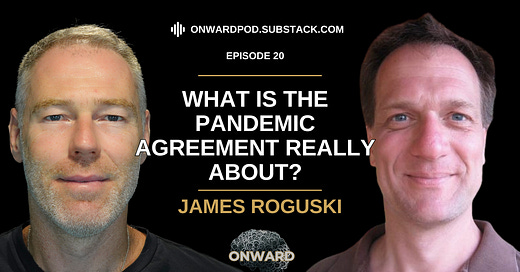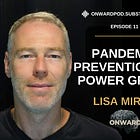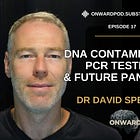Today, I’m joined by my friend James Roguski, a dedicated researcher who’s been at the forefront of exposing the World Health Organization’s (WHO) evolving influence on global health governance. If you’ve followed any of James’s work, you’ll know he’s delved deeper than anyone I know into the WHO’s agenda, specifically focusing on the International Health Regulations (IHR), the Pandemic Treaty aka Pandemic Agreement, and how these policies affect us at a personal and national level. Our conversation unveils what’s really happening with the WHO’s plans and how it impacts our rights, freedoms, and health on a global scale.
Key Topics Discussed:
1. WHO’s Pandemic Treaty vs. International Health Regulations (IHR):
James explains the distinctions and intersections between the WHO’s pandemic treaty and IHR amendments. We dig into how each policy plays a role in extending global control measures, particularly around health crises, and what that means for our personal and national sovereignty. As James puts it, the treaty is not about health, but about control and creating a business model that ultimately benefits big pharma.
2. Understanding Preventive Surveillance and the One Health Approach:
We unpack the concept of “preventive surveillance,” which goes beyond health monitoring to encompass animals, the environment, and even wastewater systems. James describes how preventive surveillance will create a never-ending cycle of testing and monitoring, allowing for justifications of new restrictions and health measures. We also look at Canada’s Bill C-293 and the push to integrate the WHO’s One Health Initiative as law in Canada. Learn more here:
3. False Narratives Around Disease and the Role of PCR Testing:
James shares insights on how PCR tests are often used to inflate “cases” by detecting harmless viral remnants. He explains how PCR tests have been applied to animals and wastewater, leading to preemptive mass animal culling and fueling public fear. This same technique is at the heart of what James calls a “surveillance state,” creating a constant need for intervention where it may not be necessary. Listen to my previous podcast with Dr David Speicher to learn more:
4. Global Push for Bio-surveillance Infrastructure:
James describes how billions of dollars are being invested into bio-surveillance labs worldwide, with a particular focus on poorer nations where infrastructure is being built to preemptively detect and respond to health threats. But instead of addressing fundamental health needs, these facilities are setting up an infrastructure for health control that aligns with the WHO’s objectives and the interests of major pharmaceutical corporations.
5. How Big Pharma Benefits from the Pandemic Fund:
We discuss how, through initiatives like the Pandemic Fund, pharmaceutical giants are guaranteed profits under the guise of “health security.” This model, James argues, is a form of racketeering that benefits corporations, not the public. By financing bio-surveillance in under-resourced areas, they’re setting up systems to expand global control and create new markets for vaccines and pharmaceuticals.
6. Sovereignty and the Role of National Legislation:
I raise the Canadian perspective, sharing how local legislation, like Bill C-293, integrates global health directives into Canadian law, eroding sovereignty. James explains that while the WHO can’t legally mandate health policies, they’re pushing national governments to adopt these rules domestically, thus sidestepping direct accountability. This, he argues, makes it harder for individuals to resist or protest because now they’re contending with their own government’s laws.
7. What We Can Do Moving Forward:
We close by discussing how listeners can take meaningful steps to resist this push for control. We encourage listeners to get informed, speak up, and advocate for health policies that actually promote individual well-being, not pharmaceutical profits. We also emphasizes the importance of a global response, as this movement extends beyond individual countries.
Additional Resources:
Pandemic Agreement - James’ summary
Bill C-293 in Canada
Trilateral pandemic preparedness agreement between Mexico, Canada and the USA

















Share this post